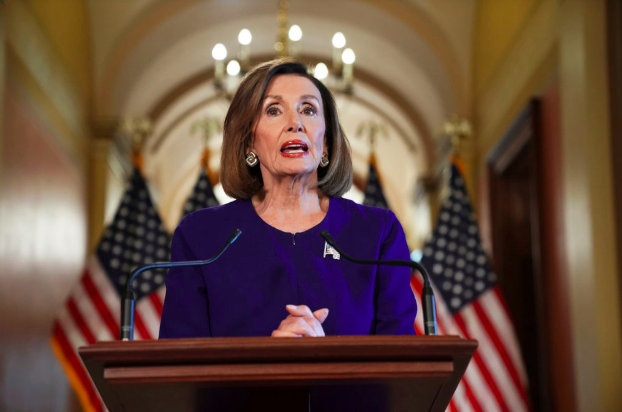By Katherine Coble || News Editor

Photo courtesy of Andrew Harnik/AP.
Last Tuesday, House Speaker Nancy Pelosi announced a formal impeachment inquiry would be launched against President Trump. The sharp reversal of policy for Pelosi came after a concerning whistleblower’s complaint which alleged Trump had been “using the power of his office to solicit interference from a foreign country in the 2020 U.S. election.” The complaint, filed by a currently-anonymous CIA official with White House experience, was forwarded to acting director of national intelligence, Joseph Maguire, who initially declined to share the complaint with Congress despite protocol to the contrary. Maguire, a 67-year-old Vice Admiral in the U.S. Navy and the Director of the National Counterterrorism Center, has only been in his position for six weeks.
The complaint centers upon a phone conversation between President Trump and the newly-elected president of Ukraine, Volodymyr Zelensky, which occurred this summer. During the call, Trump raises a conspiracy theory, floated by his personal lawyer Rudi Giuliani, that Ukraine was somehow involved in the emails stolen from the Democratic National Committee. He refers to this simply as “the whole situation.”
Trump proceeds to ask Zelensky to “do us a favor” by investigating former Vice President and presidential candidate Joe Biden and his son, Hunter. Hunter served on the board of a Ukrainian energy company that previously faced charges of corruption. During his time as Vice President, Biden – along with leaders in the majority of the West – pushed for the removal of a prosecutor assigned to this case. There is no evidence that he did so in order to aid his son, and Ukraine’s top prosecutor has since clarified that there is no wrongdoing by the Bidens that they plan to investigate.
Although the whistleblower was not in the Oval Office at the time of the call, their complaint states that “multiple White House officials with direct knowledge of the call” expressed their concerns about its contents and “were deeply disturbed by what had transpired in the phone call.” This led to efforts by White House administrators to suppress knowledge of the call by storing its records in a system for highly classified material. The call did not meet the requirements for such action – typically reserved for information about covert intelligence activities or extremely sensitive defense material – which raised further concerns in the eyes of the whistleblower.
These actions concerned the whistleblower in part because the United States is a major source of aid for Ukraine, a struggling Eastern European country currently at war with Russia over ownership of Crimea – a historically contested peninsula on the Black Sea with important oil reserves. At the time of their call, Trump had recently frozen a military aid package for Ukraine worth hundreds of millions.
Democrats argue that President Trump misused his power as the head of the executive branch – along with the threat of withholding millions in aid money – to influence Ukraine’s treatment of a political rival. They appear to have shifted a Congressional landscape in which many moderate Democrats feared impeachment as a political tool. In a speech announcing the formal inquiry into Trump’s behavior, moderate Speaker Nancy Pelosi said that “the actions taken to date by the president have seriously violated the Constitution.” From the Democratic perspective, it appears that the egregiousness of Trump’s actions has overruled the political concerns of a failed impeachment showdown. It is unclear how many Republicans would vote to remove Trump from office if impeachment occurred; former GOP Senator Jeff Flake said at the Texas Tribune Festival that he believed “at least 35” Republican senators would do so if the ballot remained anonymous.
In the days since the impeachment inquiry was launched, House Democrats have issued a subpoena for Secretary of State Mike Pompeo and indicated their desire to interview Kurt Volker, the U.S.’s special envoy for Ukraine. Volker abruptly stepped down on Friday without explanation, although reporting from The New York Times indicated that he felt it “was impossible to be effective in his assignment” given recent events.
Senior Katherine Coble is the news editor. Her email is kcoble@fandm.edu.